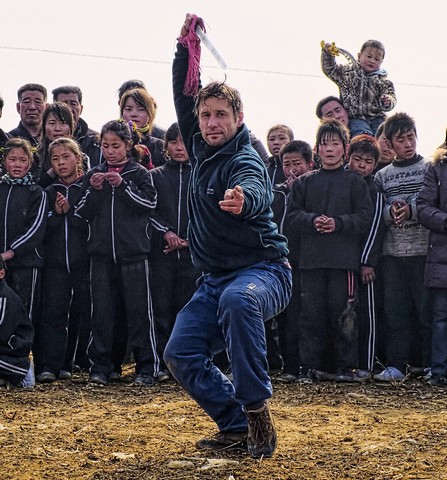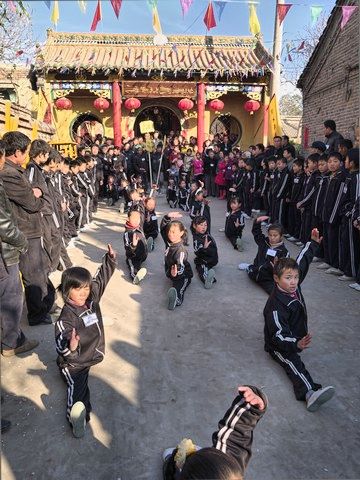题目:作为社会信任和乡土公共领域构建者的梅花拳组织–河北永年县洺河村的民族志研究
Meihua Boxers as constructors of social trust and the earth-bound public sphere.
演讲人:安瑞德 博士(Dr. Raymond P. Ambrosi)
时间:2014年5月27日星期二下午1:30
地点:中国社会科学院民族学与人类学所一层会议室
联系人:
刘正爱 电话:13717760989
杨春宇 电话:13693288072
讲座摘要:
数百年来,草根武术与道门组织在华北平原乡村的社会与文化生活中扮演了重要角色。然而这些组织通常都被归类为“反动会道门”,长期以来被误解所包围,并且在大多数情况下它们促进社会稳定的积极功能也被现代学术界所忽视,河北洺河村的梅花拳组织就是这样的一个民间道门。此项民族志研究关注的是,这个组织所开展的武术与宗教仪式活动如何在社会信任网络的构建以及乡土公共空间的扩展方面扮演了重要角色。
梅花拳信众称他们的道门为“贫道”。他们相信,遵守道门教规可以积累功德,也相信村民之间的相互合作有助于构建“和谐社会”。这个道门由两个部分组成,即武场与文场。 武场生龙活虎的场面能够吸引许多信众参与,同时它也具有展示道门公共形象的作用。文场包括许多每年固定举行的仪式以及在特定生命阶段举行的仪式,这些仪式能够提升信众的忠诚,并有助于他们投入到合作性的社会活动中。
宗教、武术活动及仪式对村民富有吸引力,而且能让信众嵌入到横向的社会网络之中。多年以来,因为政府在政策上认定这些草根社会组织非法,人们被禁止参加这些传统组织的活动。然而正是这些活动让他们能够参与到公共生活中,并由此获得一种归属感与尊严。梅花拳和相关宗教仪式的复兴可以提升家庭内部以及村庄内部的凝聚力,并且可以在距离较远的村庄以及梅花拳组织之间建立相互联系。像梅花拳这样的道门组织之所以能够吸引到新的成员加入,是因为它们带来的群体归属感丰富了成员们的生活,而且为他们提供丰富的休闲与娱乐的机会。
洺河村的梅花拳信众与支持者占村人口比例之大部分,武术与宗教活动促成的内部凝聚力与广大的社会网络使得他们数十年以来第一次能以集体活动的形式来提升村庄公共生活的质量。这些活动包括免费教授武术、扫雪、清除垃圾、铺路和修建村图书馆、非营利小学和卫生所。作为一个重生的公民社团,这个组织开始承担起更多的社会功能,为农村社会提供所急需的草根社会福利。
Abstract
For many centuries, grassroots martial arts and sectarian religious organizations have played an important role in the social and cultural lives of villagers on the North China Plain. Yet these organizations, commonly branded as “heterodox sects”, have long been shrouded in misunderstanding with their positive and stabilizing social function largely overlooked by modern scholarship. This ethnographic study examines one such sectarian group, the Plum Flower (meihuaquan) boxers in Minghe village, Hebei, to show how the group's engagement in martial arts and religious ritual is playing an important role in building networks of social trust and expanding the earth-bound public sphere. Meihuaquan adherents, describing their sect “The Way of the Poor”, believe that following sect teachings will accumulate spiritual merit and that cooperation among rural people will lead to a “harmonious society”. The sect is comprised of two parts, a Wǔchǎng Martial Field – the exciting activities of which attract and engage many followers and which serves as the public face of the sect – and a Wénchǎng Ritual Field that embodies many annual and life-stage rituals that serve to enhance adherent's faith, and engage them in cooperative sociality.
The religious and martial arts activities and rituals are compelling to villagers and function to embed adherents in the horizontal social networks that they clearly realize are desperately needed after decades of government policy that made grassroots social organization illegal and denied people access to traditional institutions and the venues by which they could participate in public life and achieve a sense of belonging and dignity. The revival of meihuaquan martial arts, and related religious rituals promote cohesion within families, within villages and interconnect geographically- distant villages and meihuaquan communities. Sectarian organizations like meihuaquan gain new members because the sense of community significantly enriches the lives of members by proffering expanded opportunities for leisure and fun.
The internal cohesion and enlarged social networks engendered by martial arts and ritual activity enables meihuaquan believers and supporters, who comprise large segments of the village, to undertake, for the first time in decades, cooperative efforts in order to improve public life in the village. Such efforts included teaching martial arts for free, building a village library and not-for-profit school, snow and garbage removal, and paving roads. The group has begun take on a broader function as a nascent civil society that provides badly-needed grassroots social welfare functions in rural society.
主讲人简介:
安瑞德(Raymond Ambrosi)
加拿大人類學者。曾就多年職於加拿大政府和研究機構,獲北京大學人類學博士學位。他的博士研究关注民间宗教、公民社会和社区发展,田野期间曾在在洺河村和周围村庄居住长达2年多。
他的地理学硕士论文是关于农村可持续发展的研究,关注民间武术团体对小型社区发展旅游产业的作用。此后他在日本开展了与当地宗教节日、民间武术和社群凝聚力相关的研究。他目前住在北京,从事研究,顾问和写作。爱好包括武术、摄影、纪录片、瑜伽和各种锻炼方式。
Raymond Ambrosi(安瑞德)
After working in government and at research institutions in Canada, Raymond Ambrosi attained his PhD in Anthropology from Peking University. His Phd research on folk religions, civil society and community development included living in Minghe village for two years.
His Geography Master’s thesis on sustainable rural development examined the role of folk martial arts as tourist attractions for small scale community development . Later work in Japan focused on religious festivals, folk martial arts and community cohesion. He is currently a researcher, consultant and writer based in Beijing. Hobbies include, naturally, martial arts, photography, videography, yoga and various exercise modalities.

